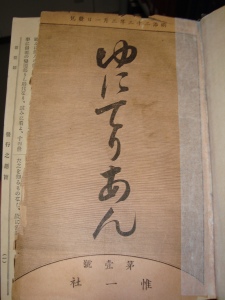Bill Baar raises the issue of security at General Assembly in the comments on the previous post, about the long history of violence against Unitarian-Universalists. While no one wants to get hysterical over this, he may have a point. Many UUs condemned the mild security checkpoint at the port of Fort Lauderdale, where GA was held last month. Some went so far as to boycott GA entirely. The issue was that police officers checked the photo IDs of adults at the door–and while only the tiniest fraction of adult UUs lack a qualifying ID, it was seen as part of a creeping surveillance culture, prone to inappropriate profiling, and discouraging to theoretical non-ID owners who might want to join in the event, such as illegal immigrants. Even among those who didn’t mind the security check, pretty much no one expressed pleasure at its presence.
Has that changed? Were some UUs living in a fantasy world before last Sunday’s attack on the Tennessee Valley UU Church? Many American schools have security checkpoints and metal detectors today. Many governmental offices and other buildings do too. Security checkpoints at sports stadium are routine. There are synagogues with them, probably churches as well.
UUs have always been targets for violence, but the last decade has been relatively quiet, so perhaps folks have gotten complacent. The truth is that we live in a dangerous world, with rightwing nuts who intend to fire 76 shotgun rounds into a UU youth performance of Annie. For every one who goes over the edge and pulls the trigger, there are many more close to that edge who may eventually tip as well.
Which brings us back to the GA security checkpoint. Putting aside the theories about exclusion, we may ask, did it keep people safer? That is the stated point of a security checkpoint, after all. Suppose the man who attacked TVUUC lived in Florida and had targeted GA instead (indeed, no greater target for someone of his mentality could be imagined–thousands of the leaders and committed members of the most liberal denomination in America, all packed into a single public building). It is possible he would have made it past the checkpoint. After all, he probably owns photo ID. But perhaps his guitar case would’ve been searched or his camera bag, in which case the shotgun and shells would’ve been discovered immediately (officers weren’t officially searching bags, but are empowered to ask to look inside them if someone is acting suspiciously). Or his unstable attitude would’ve been noticed and he would’ve been pulled aside, or at least given greater scrutiny. Even if he didn’t do anything to flag attention to himself, the presence of the checkpoint might well have been a significant deterrent, encouraging him to take his murder elsewhere. Obviously, this is only speculation, but it seems legitimate to conclude that the GA security checkpoint that so many decried most likely helped to prevent a massacre like TVUUC experienced.
So, should there be a similar security checkpoint at GA next year? An even tighter one? Should GA have security checks from now on? UUs have consistently contextualized security as the enemy, as an oppressive infringement on their rights, whether it be because of alleged age/race/class discrimination or intrusive government monitoring. Can UUs learn to see security in another light, to see the other side of the equation?
The Fort Lauderdale security checkpoint was designed to prevent terrorism. Terrorism is precisely what occurred in Knoxville this week. No one ever wants to see a metal detector and guards at the entrance to a church, like a chilling embodiment of that UCC ad that ran a couple years ago. The whole idea is disturbing, even repugnant. But so is the alternative scenario, as we witnessed. It is time for UUs to have a more informed, contextualized, and realistic discussion about security measures at churches and events. The answer may not turn out to be security checkpoints, but surely keeping heads in the sand so as not to offend liberal values isn’t going to make people safer either. The simple truth is that you are safer sitting at a Dallas Cowboys game or on an airplane or in a courthouse than you are sitting in a pew. Perhaps some thought should be put into balancing that situation a little better, or at least articulating a decline toward security in a dangerous world that goes beyond knee-jerk reactions.

